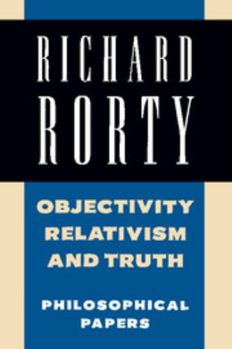Objectivity, Relativism, and Truth: Philosophical Papers
(Part of the Philosophical Papers Series)
Select Format
Select Condition 
Book Overview
In this volume Rorty offers a Deweyan account of objectivity as intersubjectivity, one that drops claims about universal validity and instead focuses on utility for the purposes of a community. The... This description may be from another edition of this product.
Format:Paperback
Language:English
ISBN:0521358779
ISBN13:9780521358774
Release Date:November 1990
Publisher:Cambridge University Press
Length:238 Pages
Weight:0.83 lbs.
Dimensions:0.7" x 5.9" x 8.9"
Related Subjects
Education & Reference History & Surveys Philosophy Politics & Social Sciences ReferenceCustomer Reviews
4 ratings
Crucial reading for Rorty students
Published by Thriftbooks.com User , 14 years ago
Rorty is a love/hate philosopher. I love him so there is your full disclosure. Love him or Hate him ORT is important reading. If you read nothing but PMN and ORT you would be well equiped to begin your apology/critique.
anti-scientific?
Published by Thriftbooks.com User , 20 years ago
A reader, Lechman, wrote here that "All scientists and engineers would reject Rortys ideas as extremely sloppy and antiscientific." Having not read this particular book [I gave it 4 stars to keep the score as I found it], I still can comment that Rorty's claims against science have nothing anti-scientific about them. As a pragmatist, Rorty would certainly not hold science to be without value, and I seriously doubt that he--in this book or in any other--challenges how scientists go about their work. Really, it's just not much of concern to science whether scientists believe themselves to be revealing metaphysical truth or not--they'll still get their work done. But the question remains, 'what is the truth-value of the results produced by science?'. Many modern people, stuck in circular thinking, attempt to justify science with scientific premises. Even the biggest advocates of science in philosophy realize that that's not tenable.
Just another relativist...
Published by Thriftbooks.com User , 22 years ago
As interesting and successful as Rorty is, he fails to make me feel comfortable identifying myself with the postmodernist liberals. Rorty holds to some sort of a skepticism. At best, he doesn't seem to care about any sort of representationalistic epistemology. Also, he tries to reduce any representationlistic epistemology to a simplistic "mirror" epistemology. To me, that is a straw-man argument. Despite Rorty's claims not to be a relativist, I would assert that he is. No doubt, we all, in the end, use arguments that could be accused of being a mere petitio principii (i.e. begging the question). However, when one is an evolutionaristic anti-essentialist at the same time, one cannot escape cultural relativism, at best. There is no common ground among language games, according to Rorty's philosophy. If so, there is no moral obligation for one to play one language game, or hold to one web of belief, as opposed to another. Well, anyway, it was a good read. Rorty is definitely another one of those innovative and interesting postmodernists (along with others like Foucault and Derrida). One difference, though, is that Rorty is much more optimistic than his peers. Of course, this optimism is groundless, though not reasonless.
Unputdownable. A thumping good read.
Published by Thriftbooks.com User , 23 years ago
I was amazed by this book. Having read several of his works since I would recommend that you should start reading Rorty with this book. You do not need to be a philosopher to read this book, or even be very interested in philosophy. All that is required is an interest in any of: History, science, politics and literature. I am pretty sure that Rorty's ideas about the common ground that these disciplines can be seen to occupy will be invigorating.





